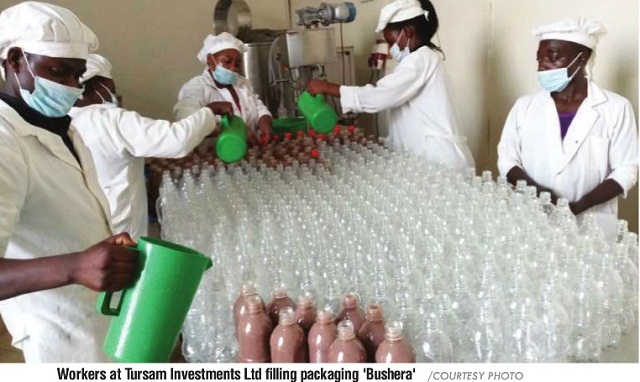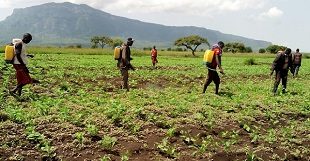Currently, Africa has about six agribusiness incubators, two of which are in Uganda

At just 27, Sam Turyatunga is the proprietor of Tursam Investments Ltd, the producers of Uhuru branded juices. In 2015, he was producing 15,000 litres of juice and had a turnover of $5,000 (Shs 17 million) per month.
His journey into agribusiness began in 2014 following a series of trainings from Afri Banana Products, an agribusiness innovation incubator for banana sector value-chain development under the Universities, Business and Research in Agricultural Innovation (UniBRAIN).
UniBRAIN was a four- year initiative of the African Commission funded by the Danish government and implemented through Forum for Agricultural Research in Africa (FARA) and the sub-regional organizations including the Association for Strengthening Agricultural Research in East and Central Africa (ASARECA).
As a second-year student of Food Processing Technology at Kyambogo University in 2013, Turyatunga was selling fruit juice to his fellow students in disposable cups due to limited skills in packaging.
“It is at this point that my faculty dean hand-picked me, linked me to ABP that I learned various business skills including processing and packaging,” says Turyatunga.
Today, his packaged juice has a shelf-life of six months, and hopes that more products will come on board as the company expands.
Turyatunga is a living example of more than 162 upcoming SMEs that have been nurtured in Uganda and Kenya along the various commodity value chains, with the ideas of proprietors honed at ABP, Consortium for enhancing University Responsiveness to Agribusiness Development (CURAD), and Sorghum Value Chain Development Consortium (SVCDC). Indeed, agribusiness incubation has emerged as a critical tool that can be used to create competitive agri-businesses in the region and spur growth in agriculture sector.
Dr. Joseph Methu, the manager for partnerships and capacity development at ASARECA, says the roll out of the incubators in the region four years ago was intended to encourage youth venture into the agriculture sector to ease unemployment, raise income, and alleviate poverty.
“We believe that involving youth in the agriculture sector will solve the issue of the high unemployment rate along the commodity value chain, and thus improve their livelihood,” Methu says, adding that the initiative is also intended to boost the agriculture sector, whose growth has remained disappointing due to low funding.
Available data shows that Uganda’s unemployment rate for young people ages 15–24 is 83%, with the rate estimated to be even higher for those who have formal degrees and live in the urban area.
Financial constraint
Kimani Muturi, the chief executive officer at ABP, says while the incubators are yielding positive results, access to finance remains the biggest hindrance in the growth of agribusiness start-ups.
Muturi says most financial institutions are unwilling to lend to agribusiness start-ups citing high risks.
“Some of our government policies are also not helping the growth of businesses in these countries including agribusiness,” Muturi says.
“For instance, setting up a bar in Kenya needs one to get a beer licence, a trading licence, a public health licence, and a music copyright licence and all these requires a lot of capital. This makes the entire process of setting a business for a start-up expensive.”
But Peter Kinyua, an executive with the Equity Bank Kenya, said financial institutions are reluctant to fund agribusiness start-ups because they are not sure of their sustainability and profitability of the proposed business projects.
“We need to work together with you (incubators) to develop products that suits the start-ups because we need to be assured that the business is sustainable and the loan will be repaid,” Kinyua said.
Nonetheless, the African Agribusiness Incubators Network (AAIN), a brainchild of UniBRAIN, is unveiling a $1 million African Agribusiness Incubation Fund in Kigali, Rwanda, next month, to boost agribusiness start-ups and SMEs inAfrica.
Mary Njeri, the community officer, agribusiness and capacity building at AAIN, said the fund has been set up in response to limited access to finance for agribusiness start-ups across the continent yet the potential to grow and benefit the their communities is huge.
“In the past years of our incubation projects, we have realised that one of the key challenges facing our incubatees is access to funds. Most of the incubatees are coming up with the ideas, commercialising their technologies but financial institutions are not ready to risk their money with them,” said Njeri.“So they needed some seed capital to grow their business and even link them to more financiers to support their businesses.”
She says the commercialisation of technologies obtained mainly from universities and research would led to the growth of agribusiness, creating jobs and wealth.
Successful business upon being nurtured will be required to enter into a joint venture with the incubators at an agreed proportion to ensure the latter’s sustainability.
George Bazirake, the dean at the Faculty of Sciences at Kyambogo University, said there’s also need for the innovators in the agribusiness to patent their processes and ideas early to avoid other business organisations from ‘stealing’ them.
He says this will enable them to earn large sums of money from their innovations in future and hence ensuring that their businesses are sustainable.
Currently, Africa is estimated to have about six agribusiness incubators, with Uganda leading the park with two agribusiness incubators while Kenya, Zambia, Ghana, and Mali have one incubator each, according to AAIN.
 The Independent Uganda: You get the Truth we Pay the Price
The Independent Uganda: You get the Truth we Pay the Price



